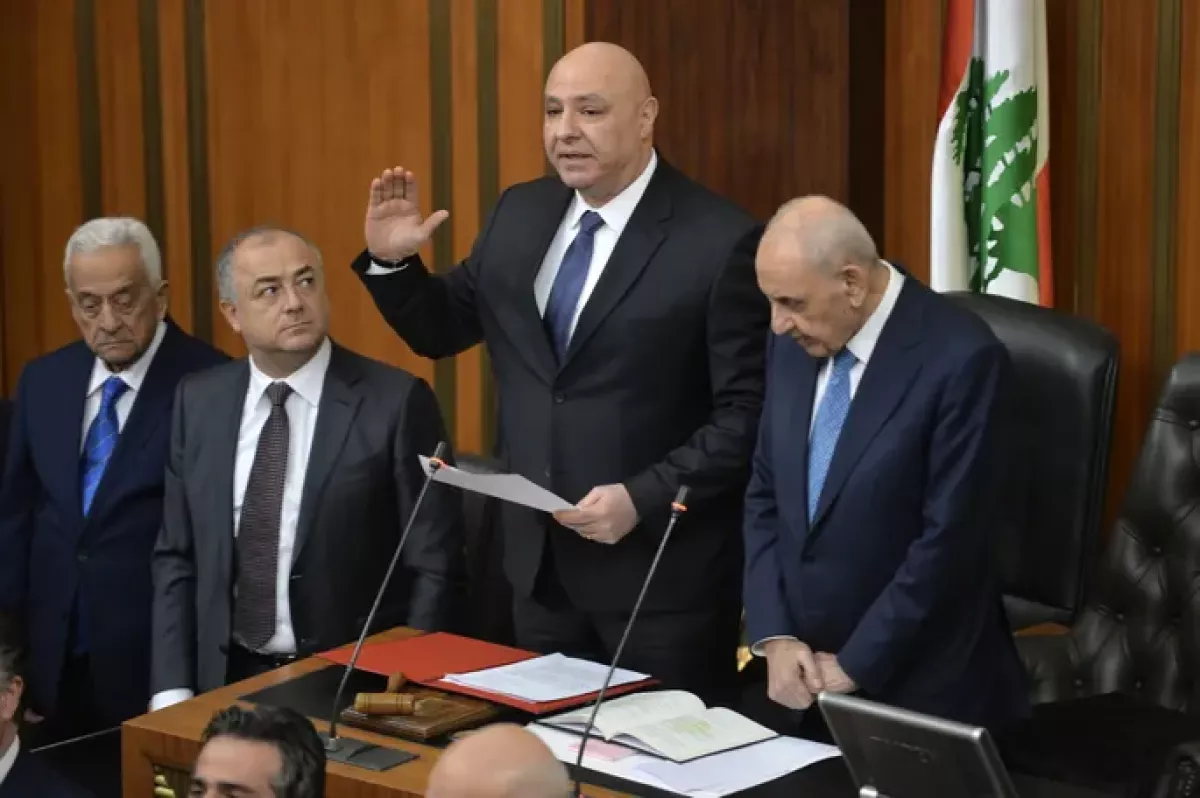General Aoun at the helm of Lebanon Challenges and hopes for the country
After two years of a leadership vacuum, Lebanon finally has a new president. The position has been taken by the former commander-in-chief of the Lebanese army, General Joseph Aoun. Notably, his predecessor in the high office was another general, Michel Aoun, which led the local press to joke about the transfer of power to the "Second Aoun."
Joseph Aoun was born in 1964 in a suburb of Beirut. He graduated from the Lebanese-American University and joined the Lebanese army in 1983. Aoun received retraining in the United States and, in 2017, led an operation to expel ISIS militants who had settled along Lebanon's border. In 2024, Joseph Aoun commanded the country's armed forces during the confrontation between Israel and the Hezbollah movement in southern Lebanon. According to Lebanese media, he played a key role in the signing of a ceasefire agreement between Hezbollah and Israel, which was brokered by the United States in November of the previous year.
Andrei Zeltin, a senior lecturer at the Russian School of Oriental Studies at the Higher School of Economics, notes that Joseph Aoun comes from an influential Lebanese clan with political tools that could help address Lebanon's political and economic challenges. The expert emphasized that Aoun's victory demonstrates the readiness of various political forces in the country to reach a consensus. The priority for the Lebanese will be domestic issues, as the country is not interested in participating in the Middle Eastern conflict.
Mohanad Hage Ali, from the Carnegie Middle East Center, noted that “being the head of US-backed Lebanese Armed Forces, Joseph Aoun has ties to the United States. While he maintained relations with everyone, Hezbollah-affiliated media often criticized him” for those US ties.

Lebanon has been in a state of economic and social crisis for many years, which has inevitably affected the country's political system. After Michel Aoun left office and retired in 2022, Lebanese parliamentarians met several times to approve a new president of the republic. However, each time the negotiations between politicians ended in failure, and the highest office in the country remained vacant.
The situation was further complicated by the peculiarities of Lebanon's constitution, which stipulates that the president must be a Maronite Christian, the prime minister must be a Sunni, and the speaker of parliament must be a Shiite. This was designed to maintain a delicate ethno-confessional balance in the republic. However, according to a number of observers, the constitution no longer reflects Lebanon's modern realities, where the Christian population has sharply decreased while the Muslim population has grown significantly.
The election of Joseph Aoun was the result of a long negotiation process. Initially, the main contenders for the highest office in the republic were Jihad Azour, director of the International Monetary Fund’s Middle East and Central Asia branch, and former parliamentarian Salah Hanin. However, after Joseph Aoun received the support of Suleiman Frangieh, leader of the Christian centre-right party "Marada," the general became the frontrunner in the race.
Even then, Joseph Aoun won only on his second attempt. Initially, he secured 71 out of the 86 parliamentary votes required. The remaining members of parliament either spoiled their ballots or submitted them blank, publicly expressing a lack of trust in the candidate. It was only in the thirteenth session of parliament that Joseph Aoun received the necessary number of votes.
Immediately after the voting results were announced, Aoun took an oath of loyalty to Lebanon: "I swear to respect the constitution and laws of the Lebanese nation and to preserve the independence and territorial integrity of the Lebanese nation."

Most of Aoun’s opponents who submitted blank ballots belong to the supporters of the Shiite parties "Hezbollah" and "Amal." They, like many Lebanese, perceive the general as a pro-Western figure, which naturally does not sit well with Iran's allies. Interestingly, Shiite parliamentarians from the "Free Patriotic Movement" (FPM) also supported the opposition, believing that the former army commander is too closely linked to Saudi Arabia. This country is a regional competitor to Lebanon, and its influence in the country’s internal politics raises concerns among many Lebanese. A source from Reuters in the Saudi government reported that Western representatives warned the speaker of the Lebanese parliament, Nabih Berri, who is close to Hezbollah, that the prospect of international aid to Lebanon would depend on Aoun's election as president.
However, during informal negotiations, Joseph Aoun was able to secure votes from Hezbollah representatives. As Mohammad Raad, the head of the Shiite bloc in parliament, explained, their deputies abstained in the first round to "send a message," but later voted for Aoun to promote "national unity." "We wanted to convey to them that we are defending sovereignty," Raad emphasized.
According to researchers from the Carnegie Center, "The election signalled a major shift in Lebanese politics. Hezbollah initially opposed Aoun for the presidency. However, the fact that the party was significantly weakened politically and militarily in the recent conflict with Israel made it unable to ultimately prevent his ascension to office."
Nevertheless, the West managed to secure a victory over its opponents, at least in the Lebanese parliament. To convince the dissenters, Saudi and French politicians visited the country. Experts also note the significant role of Washington in supporting Joseph Aoun: firstly, the Americans hope that Aoun will weaken Iran's influence in Lebanon and ultimately deal a blow to the Shiite "Axis of Resistance." Secondly, Aoun's election raises hopes for the possible improvement of relations between Lebanon and Israel.
In his first speeches, the new president outlined the main principles of his future governance: "Lebanon for the Lebanese," "The Army is the backbone of the country," and "The state has the exclusive right to use force." The first slogan is primarily directed against Palestinian refugees, who, despite having lived in Lebanon for several decades, are still not citizens of the country. The other statements by Aoun are aimed at Hezbollah, whose military potential currently surpasses that of the Lebanese army. Many observers expect the president to initiate a national dialogue on a new defence strategy, which could include integrating the party's armed factions into the state system.
It seems that the United States, Israel, and their allies believe that Joseph Aoun will be Lebanon's new Anwar Sadat, who will seek reconciliation with the Jewish state even against the public opinion of the majority of his country's citizens. In return, Washington may make significant investments in the Lebanese economy.
Outgoing U.S. President Joe Biden expressed support for the election of Joseph Aoun as Lebanon's president on January 9, stating that he is the "right leader" for the war-torn country. "President Aoun has my confidence. I believe strongly he is the right leader for this time," Biden said, adding that Aoun will provide "critical leadership" in overseeing the ceasefire between Israel and Hezbollah. "We finally have a president," Biden later added, mentioning that he spoke with Aoun by phone for "20 minutes to half an hour," describing the Lebanese leader as a "first-rate guy."
Israel's Foreign Minister Gideon Saar also welcomed the election of Joseph Aoun, the commander-in-chief of the Lebanese army, as president of Lebanon. "I hope that this choice will contribute towards stability, a better future for Lebanon and its people and to good neighborly relations," Saar wrote on the X platform.








